Activity
A Crash Course in the College Admissions Essay
The college admissions essay: even for expert writers, this essential part of the college application process can be excruciating. For less than rockstar writers, it can seem downright impossible. But by exploring the ins and outs of the essay, teens can not only become comfortable with writing about themselves: they can also learn a lot about who they are, and what they want out of the next four years of their lives. Here’s an engaging writing activity that will get your teen ready to tackle the task!
What You Need:
- pen and paper or word-processing program
What You Do:
- Choosing a topic is the Trojan Horse of the admissions essay: it sounds simple, but once you get started all sorts of ideas will come flooding out to confuse you. Should it be serious or quirky? Should it recount a story or read more like a letter? How do I sum up all the things that I am in one short essay? In short, you can’t. And there are dozens of great admissions essays for each person. But you have to choose. To get started, try answering these questions about yourself:
- What is the weirdest thing about you?
- What is something no one knows about you?
- How do you think the outside world perceives you? Are they right, or wrong?
- What gets you up in the morning (yes, your answer can be “Mom")?
- Describe a strong memory you have. Why do you think that moment stuck with you?
- Choose five words to describe your high school experience (be honest).
- Now that you have six topics to work with, you can start to think about the voice you will be using. Often, it depends on your topic. For instance, if the weirdest thing about you is that you like the smell of dirty socks, a casual, funny tone would be most appropriate. If you are writing about a sad memory, a more serious tone might be more appropriate (but not necessarily).
- Look at your list of topics and ask yourself which ones have the most potential as essay topics: which ones say something about you that you could relate to your future? For instance, if you like smelly socks, is it because it reminds you of a long soccer practice and your love of sports? If so, it could be a good topic to illustrate your potential as a college athlete.
- Choose three topics that you feel have the most potential to build an essay around. Now, write one paragraph for each. It doesn’t have to be polished or perfect – no one is going to see it! Just go with the flow, and trust your instincts. Don’t spend more than ten minutes on each one.
- Now look at your writing. What tone and style did you use? Did you joke around, use a story from your past, or speak directly to the admissions officer? Do you think that the tone and the topic support each other, or do you need to rethink your approach?
- No matter what your topic is, it is essential that the essay contains a message about who you are and why you are a great college applicant. That means that your topic needs to lead towards some sort of conclusion that sums up your “argument.”
- Choose the topic paragraph that you like the best, and think will frame you as an applicant the best. Now think about what your takeaway is. Did you recount a funny memory about getting back at a bully? Tie it up by talking about your commitment to social justice. Did you write about being labeled a “dork” in school? Let it be known that you’re proud of your deep interest in science or books.
- Now write it out! Figure out a transition from your first paragraph to your takeaway idea. Don’t spend more than ten minutes in doing so. After you’re done, read over what you’ve written. Presto! You have an awesome start to a great essay. That doesn’t mean you have to stick with that topic, but it does mean you have some writing under your belt, and a strategy for approaching your essay.
Related learning resources

Design a Road to College Board Game
Activity
Design a Road to College Board Game
Make thinking about college fun by working with your teen to design and plan a Road to College board game.
Activity

Introduction to the Electoral College
Worksheet
Introduction to the Electoral College
Introduce learners to the Electoral College with this introductory civics and government worksheet!
6th Grade
Social studies
Worksheet

Electoral College Map
Worksheet
Electoral College Map
On election night, be ready to track the results with this electoral college map. Color in the states as you prepare to find out who the president will be!
2nd Grade
Social studies
Worksheet

What Is the Electoral College?
Lesson plan
What Is the Electoral College?
In this civics lesson, your students will learn about the electoral college through first-hand experience! Then, they will write about the best way to vote using evidence to support their opinion.
5th Grade
Lesson plan
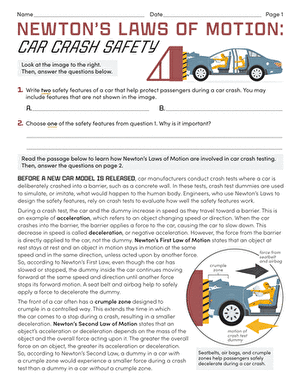
Newton's Laws of Motion: Car Crash Safety
Worksheet
Newton's Laws of Motion: Car Crash Safety
Learn how manufacturers test car safety in crash tests with this informative physics worksheet!
Science
Worksheet
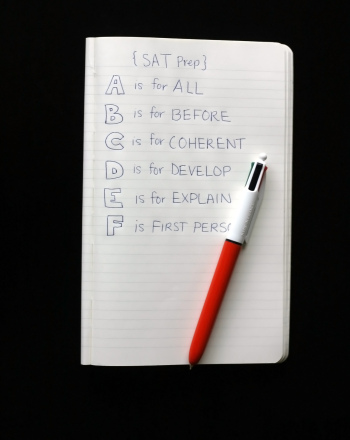
SAT Essay Tips
Activity
SAT Essay Tips
Need some SAT Essay Tips? Check out these ABCs (and DEFs) of acing the SAT essay.
Activity

Opinion Essay Essentials
Lesson plan
Opinion Essay Essentials
This lesson includes an anchor essay which students will mark up, a mixed-up essay outline for them to sort, and a web for them to organize ideas for their own essay.
4th Grade
Lesson plan

All About the Informative Essay
Lesson plan
All About the Informative Essay
This lesson includes an anchor essay which students will mark up, a mixed-up essay outline for them to sort, and a web for them to organize ideas for their own essay.
4th Grade
Lesson plan
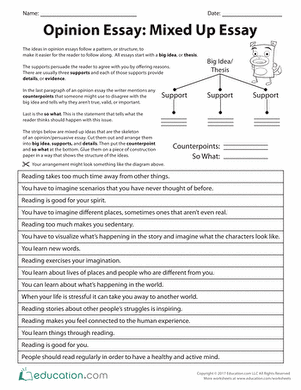
Opinion Essay: Mixed Up Essay
Worksheet
Opinion Essay: Mixed Up Essay
Students will organize and construct the skeleton of an persuasive essay with this engaging activity.
4th Grade
Worksheet
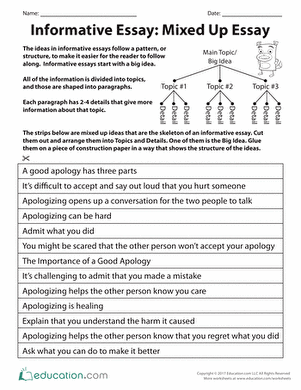
Informative Essay: Mixed Up Essay
Worksheet
Informative Essay: Mixed Up Essay
Students will organize and construct the skeleton of an informative essay with this engaging problem-solving activity.
4th Grade
Worksheet
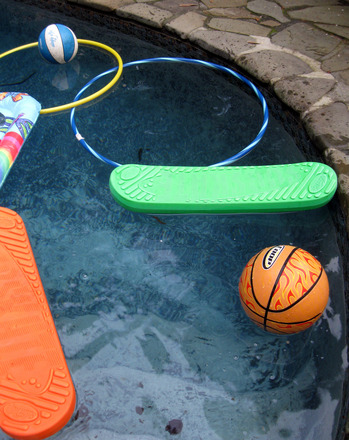
Pool Obstacle Course
Activity
Pool Obstacle Course
Here's a guide to help you design a challenging pool obstacle course for your elementary school children with ordinary pool toys and household objects.
Activity

Chore Obstacle Course
Activity
Chore Obstacle Course
This chore obstacle course will keep your child entertained and engaged, while also helping them improve their efficiency at everyday tasks.
2nd Grade
Activity



